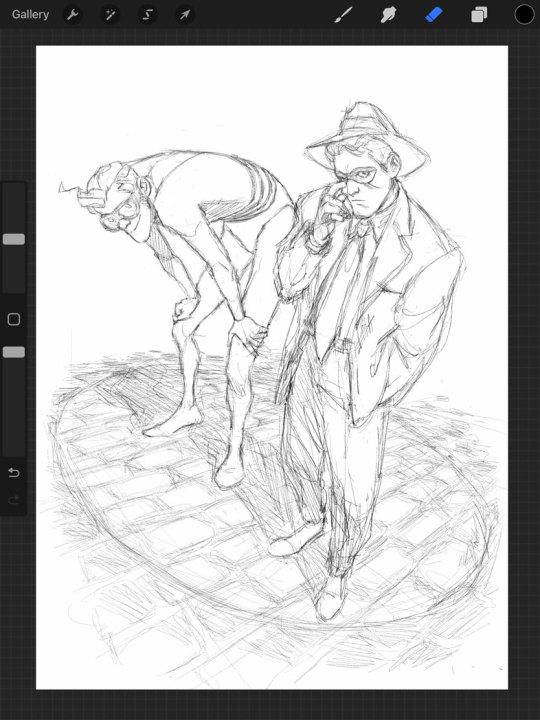Note
Any thoughts on Doctor Sivana?

Nothing too extensive but Sivana rules in a way that doesn't really invite too much introspection. He's THE archetypal mad scientist comic book supervillain and he's more or less stayed as that, arguably the most influential of them after Luthor if not outright on par with him, because while Luthor is the comic book supervillain template, the pop culture image of a mad scientist (big head short body, ugly, big glasses, always with a labcoat, hunchback and big teeth optional) is pretty much taken from Sivana. But Luthor's status atop the ladder and position opposite Superman mutated him into varying kinds of villain and a complicated character over time, where as Sivana is Sivana and never really needed to be anything else, there's just a purity to him. They've tried to make him a Luthor clone and the movie ran with that, but who cares, we all know what Sivana is, you're not fooling anyone with that guy.
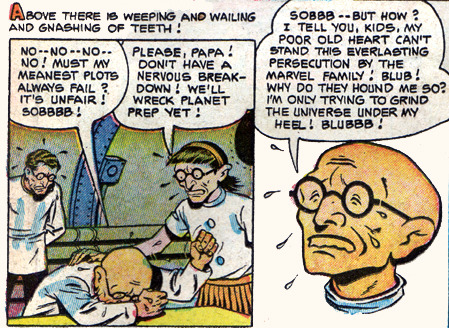
He's got a pretty great thing going as not just an evil scientist, but the evil scientist head of an evil scientist family, with children split in either looking exactly like him or looking like chiseled models who look brutally dissonant next to their dad, and he genuinely loves his kids (at least usually or in his own way), in fact he's even show loving the ones that don't support him and turned good. If he's going to be the arch-nemesis of the superhero who introduced the concept of a superhero family, he can't exactly be lacking in one of his own, and that familial aspect he has towards his children has become just as important to his characterization as the fact that he spends most of his waking hours trying to destroy a child and failing.
They get some mileage out of how ruthless he can be despite his image (and people's tendency to overlook how dark Captain Marvel stories could get), he has enough basic standards to not go as low as other DCU supervillains and Thunderworld establishes a Hannibal Lecter-esque Sivana to hammer in contrast with the main one finding him unnerving, but I'll never forget this panel:
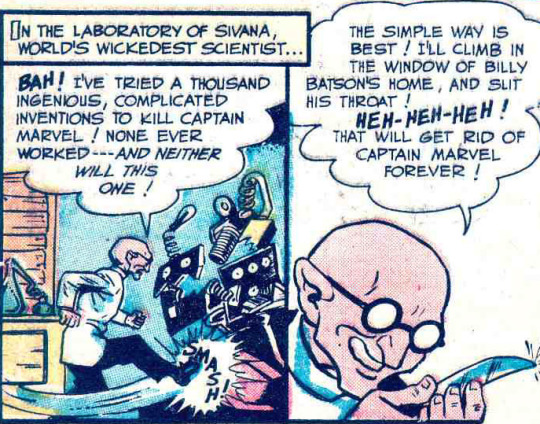
Like I said, there's a lot of dark stuff in Captain Marvel/Shazam that gets forgotten, but I also like this about Sivana, that's the flip-side of that purity I mentioned. That he can and does have almost a Doofenshmirtz-thing going on, where he's playing such an over-the-top cartoon villain 24/7 that every mundane or decent thing he does becomes inherently funny via contrast, as is his loving relationship with his own family, but he is a guy who's very serious about taking over the world and very serious about destroying Captain Marvel even if that means killing the boy Billy Batson to do it and doesn't think for one second about that contradiction. Contradictions are for chumps. He may love HIS kids, other kids are just a thing in the way. Sivana doesn't need to explain himself, like some OTHER inferior bald guy who sold out to become a CEO or something, Sivana lets his deeds do the talking.
Besides, evil is his family activity, who's to deny the joys of it to him?
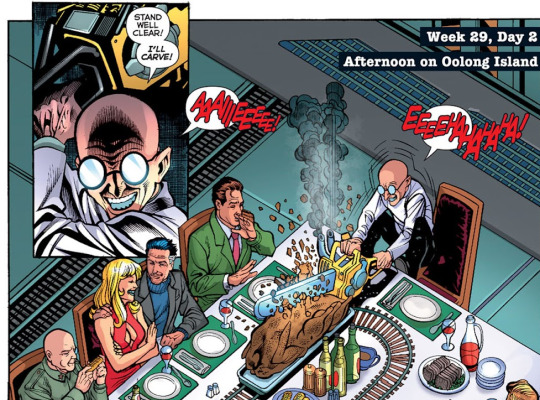
47 notes
·
View notes
Text

you all know the meme i’m not adding text
916 notes
·
View notes
Note
After watching I Will Save The Universe For Food and the last Like A Dragon games, I had an idea.
What happens in a superhero universe when superheros and supervillains become obsolete, like knights and cowboys before them?
When society outgrowns their neccesity and the system which they are part stops working how will they adapt to a world that no longer need, wants or supports them?
Which will fight back and which will try to give them a place in this new world?
(If this question is too complicated, just respond in the context of the Marvel universe)
I think that depends on what you mean by "like knights and cowboys before them", because that can mean different things. The simplest answer for these is that you don't have a superhero universe anymore, if your universe is one where superheroes can just vanish into irrelevancy and become historical curio figures that definitely 100% won't need to come back to stop the Anti-Monitor from exploding a world or two, as they always do everytime they have a "but what if we didn't need superheroes anymore?" story in a superhero universe.

Closest example I can think of within the Big Two is, probably the stretch of time between the disbanding of the Justice Society in the 1950s, and however long it takes in the continuity for Superman and the Justice League to be a thing and inaugurate the age of heroes proper, where in-between you have all those less-known almost-superheroes and your Task Force X / Challengers of the Unknown / fringe guys guys running around until the superheroes become the center of the universe again. Alfred's espionage career goes here until it's time for the Waynes to be shot, that kind of thing. And of course, that's not an ending, that's backstory, that's a gap in between proceedings. The DCU didn't stop being a superhero universe during those years and it doesn't really stop being one when all capes are gone in the Kamandi future either, where the lack of dominant superheroes is supposed to be an outlier state.
(And to address the proverbial elephant here: Watchmen is a world where superheroes are depicted as socially detrimental and warped, and yes there's only one guy with outright superpowers, but this is still 100% a superhero world where superhero things have and have happened, where superheroes and masked crimefighters were and still are an incredibly useful thing for the powers that be even in spite of being specifically outlawed. The best thing for the people who live in Watchmen would be for them to live in a world where the superhero was truly no longer supported and allowed to fade into irrelevant fantasy, but they don't, they live in the 35 minutes murder squid massacre world)
If we're comparing superheroes to knights and cowboys in the sense of the archetype, the storytelling tradition they socially occupy, the superhero as a character figure the way knights and cowboys are, then if they go, they go the way those did, and become historical characters and costumed personas within the realm of fantasy. In fact, if this is a thing that can happen or always could happen and the story chugs along just fine, it's possible you didn't even really have a superhero universe in the first place, you just had a universe with superheroes in it.

Which is a thing that can happen, and happens quite a bit in universes that want to take a crack at superheroes but don't want the proceedings to revolve around them. Like League of Extraordinary Gentlemen, or Redline with Lynchman and Johnny Boy, deranged pastiches of Batman and Robin who are very much real superheroes, fighting supervillains and outrunning cars while tanking gunfire and all, they're just not the thing the film revolves around nor are they even the weirdest thing in it, so they don't warp the universe and they're just one more freakish thing about it. The key word here is irrelevancy: Captain Universe is not the protagonist of LOEG, the universe of Redline and it's races do not revolve around Lynchman and Johnny Boy, the Crimson Chin doesn't show up to pull Timmy Turner out of trouble on most Fairly Odd Parents episodes, and etc. These guys are superheroes, they can even solve some big problems, but they are not needed, the universe spins just fine without them, which means they're not really much of superheroes to begin with. It's not for nothing you mostly see this play out with gag characters, or at least, characters whose superhero-ness makes them dissonant next to their surroundings (think Captain Falcon in Smash Bros).
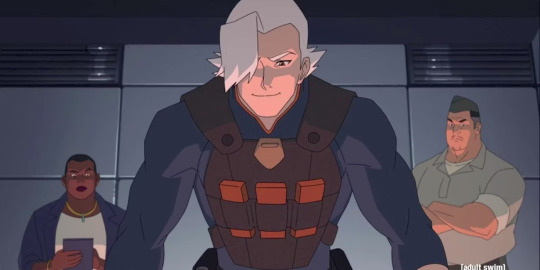
Now, if we're talking about comparing superheroes to knights and cowboys in the real world practical sense of what they were and did, if we're talking about them as part of a system through which they operated and applying it to how superheroes operate, well, then we still have cowboys, and knights, and samurai and all that. Individuals or groups with enhanced weaponry or fighting skills who go around stopping crime and enacting vigilante justice with a mission to defend something / "society". It's just we generally call them cops or private military contractors now. Or mercenaries, if you wanna split hairs a bit and go with the "independent operator who sells his services and brutalizes people for money/political favors", which was what knights and cowboys did also, but they all work within and for the same system.
There's been a lot of commentary already on how the superheroes, as a western action genre, operates as an extension of cowboy stories, most visible when we get to the superhero-supervillain dynamic, the "eternal frontier of gangsters and super-scientific menaces who play the role that Indians take in frontier narratives" as I elaborated here. And it's easy to point out the similarities between cowboys and knights, who comparatively skew a little closer to the mercenary side of things than the "cops-and-robbers" paradigm, but historically tended to benefit from political privileges and whitewashed reputations as adventuring defenders and champions of the community in very similar ways. Works that explore superheroes as an institutional power, like The Ultimates or Worm, tend to touch on this, and how "lucky" these guys are that there's always a bigger villain or monster in the room to fight to justify the continued superhero project. The superheroes can have as many Civil Wars as they want provided there is a Norman Osborn at the end of the day to be the bigger bastard they can settle their differences by punching out.
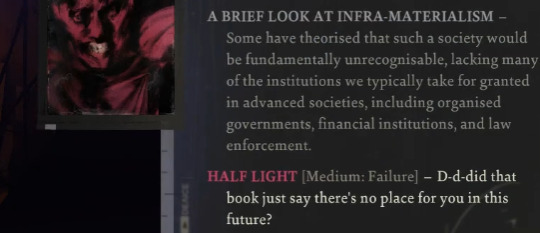
A story about a society that "outgrowns their necessity and the system which they are part of stops working", a story that abolishes the need for superheroes entirely and doesn't provide them allowance anymore, is a story about a society that would have to, at minimum, either have cops and law enforcement so effective and powerful that there's no room for superheroes or any kind of alternative to even pretend to exist, in which case congratulations, you're writing Judge Dredd, or a society that has completely abolished a need for cops and law enforcement of any kind so thoroughly that superheroes are not needed or able to fill the vacuum either, which is a much taller order and it's the kind of stuff you find in speculative political fiction and utopian sci-fi. But, even that wouldn't even necessarily stop superheroes from being active figures.
Because for one, systems fail, in several ways by design, and superheroes tend to exist in the first place because of that, conceived and presented as a superior alternative to traditional law enforcement. And two, obviously the concept of independent policing exists, the concept of communal policing or unlawful vigilantism and so on, and it's typically the thing that gets brought up as a rebuttal whenever superheroes are criticized for being too much like cops, the fact that they don't answer to law enforcement or government and therefore cannot be exploitative or opressive or, god forbid, that dirty word that starts with f and ends with -ascist. But we already live in a world where vigilantes are not supposed to be needed, a world that doesn't support them, and still they exist. And we do have a name for unaccountable, community-based solutions to crime policing and what those look like, people got very angry at Alan Moore for bringing it up even.

Of course this is an extreme negative example (if no less of a foundational one because of it), there are many many different degrees and reasons and methods by which vigilantes operate, just as there's a difference to the degrees by which heroes associate with law enforcement, but that's part of the issue here. No matter how repugnant a precedent is set by the KKK and others, vigilantism is an extremely popular idea for many reasons and it accounts for so much of why knights and cowboys and superheroes become so popular.
Everyone has their own reasons as to why they would support or become vigilantes, everyone has things and causes they'd fight or kill or die or embrace violence for. So unless we're going the utopian sci-fi route again, there is no rendering vigilantism obsolete, and there is no rendering the superhero obsolete in a superhero universe, even if we completely strip away superpowers from the equation. Vigilantism is and will always be deeply popular no matter how wrong or horrible it is as a thing for people to embrace. There is no pretending otherwise in the aftermath of this

being the most globally beloved political development of the past 5 years at minimum.
Superhero universes trap themselves into the vicious cycle where superheroes are needed to stop super-menaces and even other superheroes, and they all justify each other's existences and they all recreate Cold War dynamics just by existing (and this is something that Kieron Gillen and Caspar Wijngaard are gonna be exploring in their upcoming mini The Power Fantasy, so be on the lookout for that), even if just those who become vigilantes to stop other vigilantes from going rampant. But if superheroes aren't on some level impossible to replace, whether it's because they are genuinely necessary or simply too enmeshed into the inner workings of society to be removed without issue or ending the story, then you don't really have a superhero universe.
The questions of what happens when they go, where have all the good men gone and where are all the gods and where is streetwise Hercules to fight the rising odds, those I think tend to get explored a bit, but not too much, because generally speaking you write superhero universes to tell stories about superheroes, not to write about what happens to those universes when they're completely and utterly gone and never coming back.
Again, it is entirely possible to have fantastical universes with hero stories in them and not have superhero universes, superheroes are not synonymous with cowboys, knights, samurais, wuxia and other kinds of hero stories either. In fact, if you take a step back from America and away from European and Japanese works exploring said relationship with the US, the idea of a superhero, let alone a whole universe full of them where everything has to revolve around them, kinda shatters. Much as I may be trying to do just that, it is more than a fair bit ridiculous and self-defeating and even a little impossible to authentically put superheroes in the global south, although that is considerably less of an issue when thinking of supervillains. Those can and do crop up whenever and whatever.
And I'm ending on those because, the reason I'm not even really touching so much on the supervillain side of the question because supervillains don't actually need any kind of superhero context to exist, as I keep reiterating they predate superheroes by a significant margin and are far less defined and restricted in terms of how they exist and operate. By design, supervillains can and do exist in systems that don't allow for them and don't want them, it's kinda what they're supposed to be doing even, it's even kinda the main thing that separates a supervillain from a regular villain.
But you don't even need supervillains most of the time to be a superhero. The masked avenger pulp heroes tended to not have them, and the Golden Age superheroes took a while to get going there. You need supervillains only when you're strong and good and long-lived enough at it that you need, well,

15 notes
·
View notes
Text
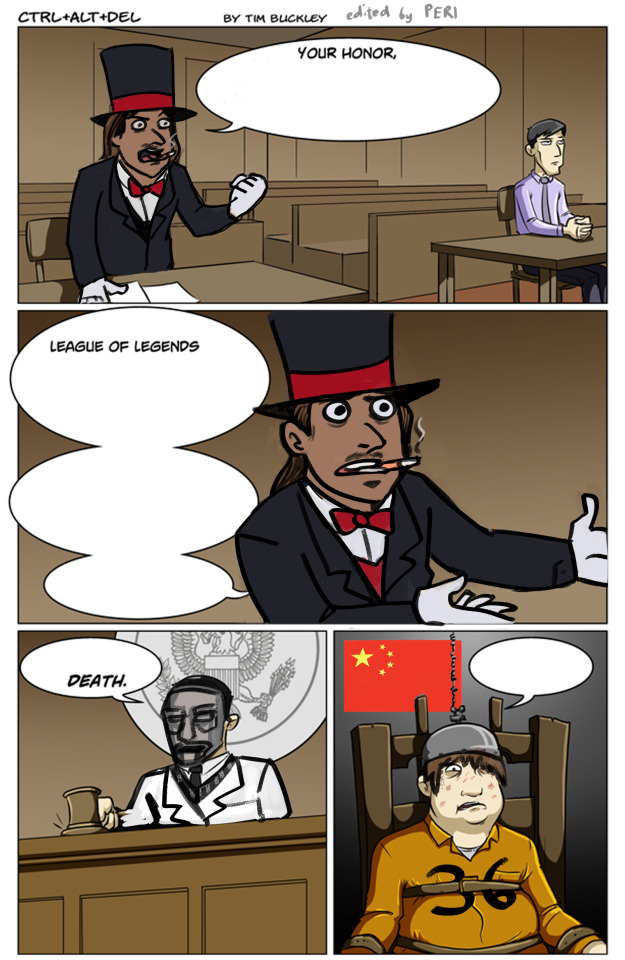
@crunchbuttsteak's idea
200 notes
·
View notes
Note
So... Thoughts on The Penguin trailer?
youtube
I'm trying to reign in my optimism a bit and be a little more cautious, but so far: ahahahah oh man, oh man oh man, I'm really excited for this.
God I gotta get back on my Sopranos watch, I gotta start making time for it again. I mean, it's been a terrific show so far, I'm not just watching it because of this, but out of everything we've seen so far this trailer is the biggest "we're doing The Sopranos" thing I've seen from them yet.
I love the mention of Rex Calabrese here and the recontextualization of his character, and how Oswald views him. For comparison's sake: In Batman Eternal, Rex Calabrese was brought up as a brutal ruler who ripped throats out with his teeth and terrified all the other cops and crime families into obeying him and who understood the natural order through which he was supplanted by Falcone, who was then supplanted by Penguin. But here, he talks about Rex Calabrese as a childhood hero who helped people, who was given a funeral parade as a show of love from the people. That's the kind of person Oz idolizes, the kind of life he wants and is starting to think he will never get to have.
Here's one of the big reasons why this is already the best take on Gangster Penguin there's ever been, and the thing I love the most about this trailer, and something that absolutely defined him in the movie as well: Oswald is completely delusional about what being a gangster actually means.
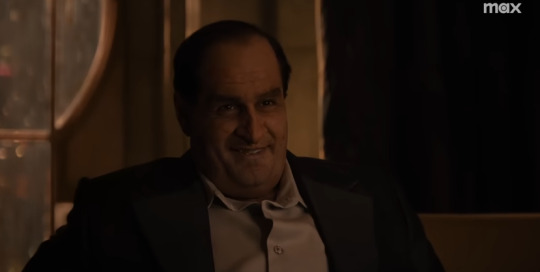
Oswald here is a guy who had his heart broken in the movie because Falcone, the guy he followed and obeyed and looked up to with every breath, turned out to be a backstabbing piece of shit, with Oswald clearly kept in the dark about the nastier things Falcone got up to. He gets very offended at the suggestion he murdered Annika or that he did the Riddler's serial killer rat maze trap, and in that deleted scene where he tries to pay Selina and keep her from going underground, he clearly wants to be the guy who treats his staff allright and pays them what they need and tries to shield her from the grubby animals downstairs that he on some level finds disgusting (even though they're on his club, and he's providing them with what they want, and he's shielding the worst one of all).
And now he's sitting here talking about his old hero, a gangster from his neighborhood who reached out to people in the street and helped them, who died with his pride in hand and was beloved by his community for it. The kind of guy that Oswald emotionally talks about as someone he wants to be like, as he's getting ready to go to war and shoot and stab and blow up people in a crumbling nightmare city.
This is, in spite of everything, a guy who is very, very preoccupied with being some kind of gentleman, or at least more of a gentleman than the criminals he cavorts with, and a guy whose vision of himself doesn't match the reality of what he does, and a guy who has made a ridiculous cartoon of himself in order to try and forcing that childish idea into reality. This is a Penguin who lives and dresses and acts as an absurd child's idea of a rich and powerful man, except what that entails has changed.

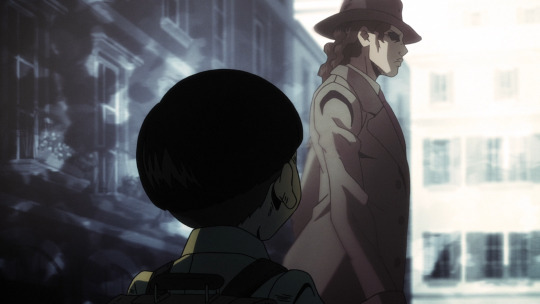
Instead of wanting to be the romantic aristocrat, instead of playing the cultured gentleman thief, this Oswald wants to be the friendly gangster. He wants to be the neighborhood king who runs soup kitchens and helps old ladies cross the street and inspires beaten-down insecure loser kids like him to strive for more, the mafioso who looks out for women and kids and isn't scared of the cops and gets funeral parades for being such a swell guy who just does a little crime ova here every now and then, eeyy, c'maan.
Oswald here has the same dream as Giorno Giovanna, from JoJo Part 5, and he saw Rex Calabrese as the distant mysterious gangster who looked out for Giorno and invisibly kept bullies from picking on him and made the neighborhood treat him decently, who showed him what real power, power to protect himself and others, looks like, and he very clearly wanted to project that kind of fantasy onto Falcone, who is an actual gangster, and thus doesn't act remotely the way Oswald thinks they ought to act.
Oswald here wants to be the Depression-era honorable mafioso, just as outdated and fictional and mismatched a character in our time as the gentleman thief aristocrat was to the 1940s, and to me that feels like the first time anyone's really made Penguin-as-Gangster be a concept worth it's weight and play into makes him so engaging a character. It's just instead of being a burglar and crimelord who reads Raffles and quotes Shakespeare, this Oswald is a Tony Soprano who prays every night to be Don Corleone once he grows up.
And he might even get his chance! Because the way things are going in Gotham, with the city destroyed and in need of rebuilding, with the entire infrastructure crumbled and the mob having lost their figureheads and supply, and Oswald holding one of the few structures not completely totaled, he has the opportunity of a lifetime here to swoop in and play the Capone/Dillinger to this Depression-flavored Gotham.
And I'm really curious as to where he's heading within the show: whether he's going to make this fantasy of his work and be the reasonable flexible-but-unbeatable crimelord and the sole player remaining in town, or whether the downfall of organized crime in Gotham and the rise of the weirdos means that our beloved waddling freak is going to have to come to terms with what he actually is, and grab his colorful suits and his new name and make some umbrella guns to embrace and ride his bizarre awfulness into the sunset.

#replies tag#superheroes#dc comics#batman#penguin#the penguin#oswald cobblepot#colin farrell#matt reeves#hbo max#the batman
132 notes
·
View notes
Note
Thoughts on the master of fear, Scarecrow? Also, fave design, he has so many good ones (second BTAS, his trading card one, mistress of fear, Gaslight,, fear for sale, the Arkham Games etc)?

Hey so, do any of you remember Batman Live? It was this really fun, extravagant stage show that touched on a lot of Batman hallmarks and was generally a really fun time as far as I recall. I went to the São Paulo premiere with my family, and I was a little too young to really recall most of it now, but some things I definitely remember like the huge Joker hot air balloon made of performers in bodypaint, or the comedy sequences in the Iceberg Lounge. The one thing that stuck with me the most was when the Scarecrow showed up. Batman goes to Arkham Asylum and the entire comedy camp tone drops dead, as he walks in and finds all these bodies in straightjackets hanging from chains, and the doors open as The Scarecrow walks towards him in stilts, summoning loud smoke eruptions that are poisoning and weakening Batman as he leers over him. That part actually did scare me as a kid, and it was probably the first time I had any kind of feelings on Scarecrow imprinted in me.
I was introduced to The Scarecrow as this uniquely horrifying villain who could terrify through presentation alone. I didn't particularly understand what the fear gas was, I was too taken with that ungainly thing up there with the stilts and all those people turned into cadaverous decorations, lurking from the endless halls of the asylum, who towered over everyone and placed Batman into a writhing breakdown with a few gestures, and never appeared again until the cast roll, completely absent from the rogues gatherings after. Granted, of course that's because the stilts prevented him from joining the fight scenes, but that helped to reinforce his mystery. He wasn't someone Batman was going to punch back, no no, the Scarecrow simply vanished as soon as he was done with disarming Batman, and you'd just have to pray for that unfathomable creep to never show up again.
And I'd say this might be part of why I've never been too big on the fear gas, in part because I was first enraptured by a version of The Scarecrow who clearly didn't need it that much, or at least, could do much more besides it. The Scarecrow is, I'd say actually one of my top 10 DC characters, half of that on the basis of his designs, but he's a character who tends to really, really struggle under a lack of cohesion and being subordinate to his gimmick, much more so than the other rogues. The fear gas is a good gimmick, but it is just that, a gimmick, and one that's usually reliant on how far can the story push the horror and the visuals to at least make it effectively scary for us, otherwise it gets incredibly boring very fast, and it's not even a gimmick exclusive to him since so many other characters have similar mind control/illusion abilities/gadgetry at hand (and to say nothing of Hugo Strange, who first used fear gas and who quite frankly kicks the Scarecrow's ass in terms of quality storylines, although Hugo does that to most of the other Batman villains too)
The Scarecrow has become the go-to character for hallucination sequences / revisiting character traumas, which frequently makes him less of a character and more so a convenient plot device, a problem heightened by the larger issue here that is his inconsistent motivation, or lack thereof. He lacks the kind of "breakout" stories that his fellow major Batman villains have had that usually cement an ongoing characterization, and his most famous/celebrated appearences in mass media don't really do much to combat the assertion that he is shallow and weak and whose only asset is the gas (namely, his boss fights in Arkham Asylum, which are all about the fear gas hallucination scares, and his role in Nolan's Batman, which is very fun, but also purposefully plays him up for ridicule and lack of depth next to the other villains)
These days, the Scarecrow is a tedious pip-squeak. His schemes lack verve, his cruelties stir little in the way of frissons. Haunted by cliché to an even greater extent than the other rogues, he’s often brought low with a single sock to the jaw delivered by Batman, or by finding himself on the receiving end of his own fear-inducing concoctions. He often acts as a pawn in the hands of bigger, badder third parties. He’s ostensibly a stand-in for the figure of the reductive, smug and hypocritical psychologist, nicely bundled up for the audience to humiliate in effigy - TheMindlessOnes's rogue review for Scarecrow
In "Nothing to Fear" it is explained that Jonathan Crane has always had this "thing" for scaring people. (Just as Snidely Whiplash had his "thing" for tying women to railroad tracks, I suppose.) But this is a wan kind of motive. One senses sadly that the real motive for the Scarecrow's behavior lies in the writer's need for someone to do something reprehensible. At the root of the matter may be a difficulty in sorting out the Scarecrow's ends from his means, with a consequent confusion between the goals the Scarecrow intends to reach and the tactics he employs in reaching them.
As a psychologist specializing in phobic disorders, Crane knows how to induce fear and trembling in his victims. But this tells us nothing about what the Scarecrow wants to accomplish. And without a sense or statement of what those goals are, the writer will be tempted to substitute means for end and make the Scarecrow's goal simply the scaring of people. Usually his actions are woefully underexplained - Dreams in Darkness' review by Toonzone
You might think that I'd be advocating for the Scarecrow, then, to disregard a need for a motivation and become as unknowable and horrific as possible, to recapture the awe I felt at his Batman Live self, but no, not at all. For one, I don't think the best version of anything is necessarily the one that made the most impact on me as a kid. Two, there have been some attempts over the years to remove Scarecrow from the toxin or seriously amp him up as a threat, and frankly, most of those have only made the character dramatically worse and more boring (I don't remember the name, but there was a Batman story a while ago where he goes on a big scary killing spree with no toxin just to prove he can and it was fucking terrible). Three, and the big one here, is that this pretty much forces you to get rid of Dr. Jonathan Crane, and I think that does a disservice to the character's potential. I think that's giving up on trying to make him work as a character and I don't think you have to do that.

My preferred characterization for Crane is one that emphasizes his nature as a scholar turned supervillain. The cold and misanthropic and neurotic nerd professor who spent most of his salary on books and took to terrorizing the city as a costumed criminal in part because he wanted money to buy more books. Who takes off the costume mid-crime spree to school his henchmen on specifics of brain chemistry, who gets revenge on those that wrong his students or even employs them as henchmen, still the same guy who thinks there's nothing wrong with firing a loaded gun in a packed classroom as a demonstration. Far less interested in human connections than he is in human reactions, things that can surprise him or that he can catalogue or research or write about. Someone who's not a sadist for sadism's sake, but who doesn't really see you as a person so much as he sees a test subject. I like Crane as a snarky humorous heel who thinks of himself as amoral and mature while doing horribly immoral and childish things, the Herbert West or Rusty Venture of Batman villains (James Urbaniak is definitely the voice I'd pick for him).
My preferred kind of motivation for him is something along the lines of how he's portrayed in most of Kings of Fear, where he puts Batman through the wringer in part as an attempt to get to him and cure him once and for all, or issues #4-5 of The Batman Adventures where he induces city-wide illiteracy in part as a protest against the city's failing education. In Gothtopia he makes all of Gotham hallucinate their perfect ideal lives, eliminating the crime rate but causing the suicide rate to spike up in return, and yes it does turn out to be the set-up for a really generic "fear gas everyone with blimps and make everyone twice as scared" pay off when his involvement is revealed, but I always thought Scarecrow being able and willing to do that, to create these huge and even benevolent-seeming social experiments, as an idea with legs. Fear State was frustratingly halfway there, with the initial set-up of Scarecrow pursuing a theory for fear-based social upheaval, but on top of not being very good, it also wound up that he was just doing the same old thing again and had Batman call him out as someone who just wanted to gas the city and make everyone scared again and never changes and does anything different, which seemed like Tynion defeating his own purpose of trying to make a defining Scarecrow story and address his lack of one, completely failing to address the why the character has that kind of problem and upending itself for meta commentary before doing anything interesting.

Even Kings of Fear, easily the best Scarecrow story of the past decades if not outright ever, kinda ends in a bit of a cop-out where The Scarecrow has to be wrong ("Even when he's telling the truth, he's lying, and even when he's right, he's wrong", Gordon tells Batman to reassure him, to nullify the past 5 issues criticizing and tearing into Batman from every angle imaginable), and he has to be a sadist who just wanted to fuck with Batman and uncover his worst fears because it's what he does. Why does Scarecrow want to unravel people and wrench their worst fears into the surface? Because he's a sadist who gets off on it? I guess that's the canon answer most of the time, but it's such a boring, weak one. Because he wants revenge on the world / bullies? Still weak, done better by other villains even. Because of an unspeakably traumatic childhood that taught him the world was ruled by fear and therefore driving him to become it's master? Okay, but it still doesn't actually answer what he wants to get out of doing what he does.
We know that Jonathan Crane was a fragile youth routinely terrorized and abused by others and plainly traumatized by his experiences. We know that he is learned and brilliant and given to introspection and fantasy.
From this base it is not hard to imagine Crane turning into a man fiercely devoted to solitude and study and capable of a murderous rage when his privacy is violated. It is possible, in other words, to imagine him as a reactive force, in the mold of Freeze, systematically terrorizing and destroying anyone who crosses him but rarely wanting to start trouble himself.
Or we can imagine him as a mercenary, a specialist hired by others for nefarious purposes, but who is not himself strongly motivated by particular rages or desires.
But if the Scarecrow is going to remain a sadist and a sadist only—if he is going to be moved only by the psychotic desire to harm others—we ought to be made to feel the seductive power that sadism has over its practitioners; we should be made to feel and appreciate the hot and sour joy that comes from the purposeful humiliation of another - Dreams in Darkness review by Toonzone
It's kind of a frustrating pattern in a lot of his stories where he gives a reason for doing something, and it turns out to be a cover for yet another sadistic fear gas attack, but his cover reason was a more interesting motivation for him than what he actually was going for. A villain who mainly just gets a kick out of hurting people and concocts bullshit excuses and reasons to justify said hurting? The Joker does that already, but the Joker always clearly states what he wants and has all those ways to make cruelty for cruelty's sake entertaining. If that's all The Scarecrow is also, no wonder he's going to be so incredibly lacking most of the time (nevermind the fact that he's never going to be the guy most infamous for gassing Gotham City).
Yes, he may be sadistic and cruel, he may enjoy what he does too much, and maybe there really isn't any kind of realistic explanation as to why a man would dress up as a scarecrow to commit terrorism and spray innocent people with chemicals to make them terrified, but refer to the guy he's fighting. "Realistic" is the wrong term. The issue here is less "why" the Scarecrow does what he does, and more what is he hoping to get out of it. Granted, this is less of a concern if you're playing The Scarecrow as a figure of horror, someone who's not even really human underneath that outfit. But I think that locks away much of his versatility. The Scarecrow needs Jonathan Crane, and I think there's good stuff to like about that awful man.

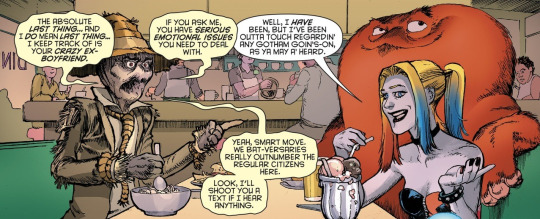
I like Jonathan Crane the sardonic pragmatic scientist who still embraces his hopelessly ridiculous life, a guy who's not nearly as above it all as he'd like to be and has wants and needs moreso than he really likes to admit. I like him as a book lover, as a fan of horror, I like him as the kind of guy who'd send fan mail to Elvira and break out of Arkham just to catch a Halloween parade and guest star in a Scooby-Doo movie for a change. I like him as someone who'd have a decent working relationship with the other rogues and pal with the Legion of Doom and get into a physical spat with Riddler over a chess game. Someone who custom-makes his own outfits and equipment, who makes scythes out of animal bones to fight Batman with, who picked the scarecrow motif in part because it was a term of derision his colleagues used on him.
Who pours himself over his research as he records his theories in a tape recorder, the kind of guy who grouses at having to clean another cell because he's getting annoyed at his test subjects killing themselves, seriously guys the cleaning supplies for this batch were as fresh as they could be, and the iguana amygdalas I used should be stopping your neocortexes from overreacting this strongly. Subject #3 over there got over his fear of centipedes yesterday and he hasn't screamed all morning, I'm gonna need the rest of you to stop being such babies, okay?

It must be terribly liberating for Crane, to transcend mere ugliness and become inhuman. Of all the rogues, he’s easily the one who takes Batman’s “I need a disguise; I shall become a beast of the night” schtick and runs with it the farthest - TheMindlessOnes's rogue review for Scarecrow
And that's for Jonathan Crane, man of science. The Scarecrow, however, is not science, he is unreason incarnate, and to me what most makes The Scarecrow work as a Batman villain has nothing to do with "they both use fear as a weapon", I always thought that was a bit shallow of an angle to pursue (most, if not all, the villains rely on fear, it comes with the whole "crime" thing). The two have a stronger connection via the costume, the theatricality, the becoming a creature of the night angle. None of the other major Batman villains are going into their costumes the way The Scarecrow is. They have their personas and varying degrees of division between them and their "real selves", but few of them are wearing outright identity-separating Halloween Monster Costumes with separate names and personalities they can dip in and out of at their convenience.
And I'm gonna interrupt myself to answer your second question. I couldn't pick just one design, so counting the Batman Live one above, I picked 10. These are not in order and they're not necessarily how I'd design him, I'd say my actual favorite Scarecrow designs are fan-made, but if I was going to pick out of "official" material these are the ones I'd go for. It's time for:


(Left-to-right: George Pratt's Scarecrow pin-up, Phil Jimenez's Scarecrow design, Ed Natividad's concept art for Suicide Squad)
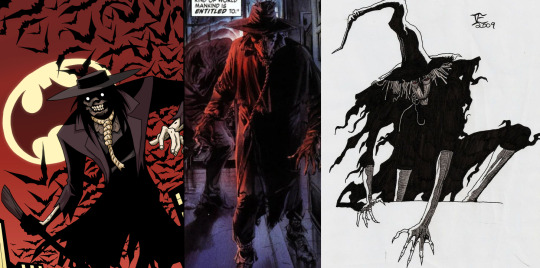
(Left-to-right: His TNBA design by Bruce Timm as drawn by Luciano Vecchio, Alex Ross's design for Justice, and Tim Sale's Scarecrow)

(Left-to-right: Kelley Jones' design for Kings of Fear, Jeremy Raapack's design for Legends of the Dark Knight #25, Scarecrow's design in Happy Halloween, Scooby-Doo!)
*cough*, anyway: Most of the other rogues with their signature suits or masks or body distortions don't tend to have closets full of different variant Batsuits and scarecrow costumes to choose and devote to their cause and ideal, that they sit at night tailoring on how to make scarier or more loaded with weapons, that they might even have conversations with, things that sit in their closets waiting because both of these brilliant men, men who have (or at least had) different civilian lives, men who could stop doing this at any time, who both decided that becoming a Halloween monster prowling the streets to inflict terror is a necessary, even productive use of their time.
And I think that's the key word I want to end here, productive. I think The Scarecrow needs to be more productive. Because even if he's not aware of it, he is achieving progress via his research, and there is one way he's proved his ideas: Batman walks out of every fight they have stronger. Every encounter they have is a test that Batman resists and walks out of more able to cope with his own traumas, or at least, better able to resist them being weaponized against him. I always wanted to explore the idea that Crane is genuinely convinced he's doing people a favor or at least achieving something via all these horrible Scarecrow campaigns, and one thing he has achieved is that Batman is never not prepared for chemical attacks or assaults on his mind, Batman resists ungodly trials of willpower and determination and courage, in part because he has to deal with the Scarecrow pumping terror juice in his brain semi-regularly.
The fact that Crane loses and gets beaten up and has to retry schemes again and again and kill people and join the costume parade just to lure Batman is fairly inconsequential to him, so long as it gets results. He's not interested in dissecting Batman's brain or being more like Batman, that's Hugo Strange's thing. Hugo Strange needs Batman to be fearless, allmighty and perfect, where as Jonathan Crane wants nothing more than to unearth and study the fears and kinks in the armor, the dead last thing he wants is a perfect man. Hugo Strange wants to crawl naked into the mask of the great and terrible fascist and never come out, where as The Scarecrow wants to crack open all the masks in the world and feast luridly on whatever seeps out.
Batman isn't just the ultimate trial against his fear-ruled worldview (or even affirmation), and he isn't just a breakthrough waiting to happen: he might be his greatest success as of yet. A case study on the success of exposure therapy, proof of potential medicinal applications for his formula, the greatest guinea pig of all time because he won't die no matter what you pump into him, you name it. So what if all those other people couldn't stomach the procedure, so what if those precious innocents are too weak and stupid and useless to not get in the way of research, it's clearly worked wonders for those who could take it.
And if the future belongs to men like Batman, if all of these superheroes and supervillains are the way things are going to be like forever, if the future is Bat-shaped and as vast and uncertain and horrible as the forces shaping it, the future needs to be prepared. The future needs to grapple with it's past and face it's greatest horrors and become stronger for it. There is no such thing as overcoming fear, there is only living with it, embracing it, bowing to the primordial instinct that knows the answer before you do. Mankind grew and developed it's intelligence and tools out of fear, fear of the bigger predators out there, fear of the other cavemen, fear of starvation and death and everything they couldn't understand and master until they learned to fear it. What better knowledge to pass along than fear? And who is better qualified to teach about fear?

Maybe Crane isn't just another monster with a grudge, maybe he isn't another costumed revenge killer, maybe he isn't just a power-tripping sadist bully out to torment others because he can, and maybe he isn't a hopeless traumatized madman who destroyed his professional and personal life in a monstrous quest to satisfy an obsession ruling his soul.
Maybe he is a sane response to an insane situation. Ever heard that one before?
81 notes
·
View notes
Note
This feels like the kind of ask someone should've gotten around to a million years ago, but it seems it falls to me: The Shadow vs. The Penguin. Is there anything there?
Anonymous asked: How would pulp heroes like the Shadow or Green Hornet respond to The Penguin. Characters like Joker or Ra’s I can see them gunning down but that feels weird to do with Oswald “Pengy For President” Cobblepot
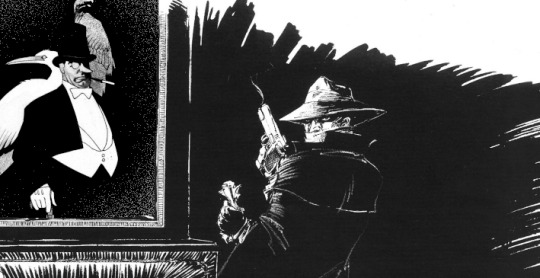
(Penguin by Mike Mignola. The Shadow by Lela Dowling)
It's amazing, really, what you've built here. You had a vision and made it real. Every Batman in existence respects you for it, Oswald. In fact, I'll tell you a secret…people assume that Batman's last enemy on most worlds out there is Joker. Maybe Riddler, or Ra's…but it's you.
See, you grow this crime empire until he has to deal with you. - The Batman Who Laughs #3
What there is here is a bit of an impasse, because yes obviously this is brutally, comically one-sided against The Penguin. Pitting most if not all Batman villains against The Shadow is going to be already one-sided in The Shadow's favor. Pick a Batman villain, even the big ones that make Batman the underdog like Ra's and Bane, and you can name a similar threat that The Shadow already defeated. Even if you don't count superpowered cheating with whatever abilities The Shadow has this moment, he's already dealt with most of everything they can do, he's beaten these strategies and puzzles and countless death traps at their own game, and yeah there's the fact that he's known for the fact his villains don't tend to come back for round two even when they don't die facing him. Villains that he faces tend to die specifically because they try to kill him and he returns their fire (it's important to establish here that, unless his enemies have guns drawn on innocent people, The Shadow rarely shoots first - they always have a chance to lay down their arms and walk away, a chance that most obviously never take), and Penguin's known for his unwillingness to go down without a fight and for his signature move being a concealed sneak attack, which means his odds of dying are near dead certain.
In fact, The Shadow already fought a Penguin-esque guy as one of his few reocurring villains, via The Wasp, Gibson's latter day attempt to make another Voodoo Master/Shiwan Khan. The Wasp is a "Napoleon of crime" whose body and strange buzz voice and antics and operations are themed after his namesake animal/insects, who uses a concealed weapon part of said theme (an electric "sting" on his hand powered by batteries on his belt), who connects Cranston to The Shadow and was also the only villain to figure out that Kent Allard is The Shadow. He was cleverer and more resourceful and harder to defeat than most of the typical Shadow villains, and to his credit he did achieve a thing nobody else really achieved in the run, and it didn't really do him that much (learning the secret identity tends to be a death sentence for vigilantes, but for The Shadow it's really not that big a deal, given how easily he can make new ones) and he still went out like a chump, and he's only really remembered as the less impressive of the reocurring supervillains, lacking the outright superpowers of the others. It seems like a fairly closed case.
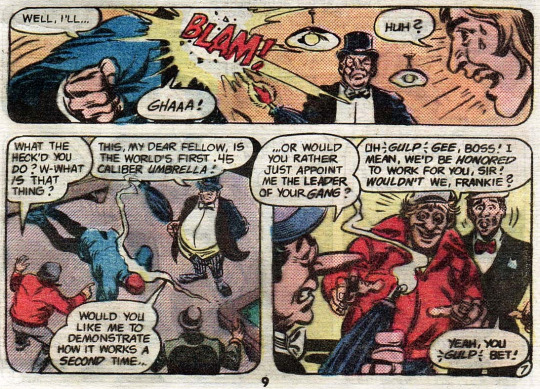
Problem is, the more comically one-sided the odds are against Oswald, the more likely he is to actually win or at least survive because of that. Going up against people who should have his goose cooked, getting away with things he absolutely shouldn't, slipping away to survive and put one over Johnny Law, that's his thing, it's been his thing from day one. He is no stranger to dealing with vigilantes or people much bigger and stronger and scarier than him, it wasn't that long ago he was walking off getting shot at point blank and later faking his death. Penguin is no common criminal, and he isn't just a guy who's unusually smart and competent at it enough to waddle among supervillains either. In his narrative domain, The Shadow is unbeatable, but in his narrative home, The Penguin is unkillable, and not just because he's a comic book villain who survives by editorial demand. He has protagonist survival clause now.
In his ups and downs over the years, he survived in large part by becoming a fixture of Gotham, someone impossible to uproot from the setting, with his ignanimous transformation into stool-pigeon and banal crimelord in part a consequence of said survival. After more or less retiring from villainy, the next step was to very gradually join the likes of Catwoman, Azrael, Harley Quinn and Renee Montoya in their careers as independent Gotham-adjacent protagonists, which is why he now gets to have his own tv series (the second one at that, because Gotham exists and if it achieved anything, it was proving that there's an audience for The Penguin Show - and yes it still is very much shitty, but also not remotely surprising, that the instant they made a version of Oswald thin, that guy became a critical and fandom darling overnight). The Penguin wormed his way into becoming irreplaceable and they tried, they tried very hard over the years to replace this guy, and he's taken some brutal lumps and fell off very hard from the Bat-villain totem pole, but even that just enabled him to ascend to a different pole and one that makes it he can't really be just another gangster or supervillain to be knocked around, and one that's almost specifically built to ensure his narrative survival. Someone who serves the story better by being alive.
Has The Shadow ever dealt with a guy like this? Yes, yes he has. The Shadow is no stranger to criminal protagonists, or the concept of nuance, or redemption. He is certainly no stranger to the gentleman of crime who is more than what he seems.
The man who entered was tall and well built. He had the manner of a gentleman. He was attired in a perfectly fitting dress suit, which he wore with the easy air of a man of the world - Kings of Crime
The gentleman of crime arose, picked up his hat and coat and reached for his cane. There, his form obscured, The Shadow stood close enough to overhear what Graham Wellerton was saying. The gentleman of crime was talking to members of his mob.
What was Graham Wellerton's purpose? How and why had the gentleman of crime parted from his men? Why was he no longer engaged in robbery? - Road of Crime
To all appearance, George Ellerby was a gentleman; and he was actually qualified to prove such a claim. But tonight, he was to be a gentleman of crime - Battle of Greed

"I wonder," said Sandersham, slowly, "just how much The Shadow can do, or intends to do. Who is he, Krengle? How powerful is he?"
"No one knows who The Shadow is," replied the lawyer. "But he is death on crooks, they say, and he considers crime to be much broader than its legal implications." - Battle of Greed
There's about 5 Shadow novels that specifically touch on the topic of redemption. There are others where it comes up, plenty of others where The Shadow goes the extra mile in giving criminals a chance, and stories that highlight the lines that The Shadow draws in deciding how to deal with criminals (“To murderers, The Shadow dealt death: to such schemes (robbery, fraud, etc), he dealt ridicule.” - The Third Shadow), but those 5 make a focus of it. In all of those 5, we meet characters that can be called a "gentleman of crime". They are cunning, respectable-looking young men who use their smarts for crime, largely because of social circumstances that force them into using criminal tactics for dealing with life-consuming problems that the law has failed them in, and The Shadow assists them in addressing and rectifying said problems and turning their lives around.
In Kings of Crime, blackmailer and swindler Hubert Carpenter. In Road of Crime, the protagonist Graham Wellerton, "bank robber deluxe". In The Broken Napoleons, engineer Curt Sturley. Battle of Greed opens with George Ellerby, although he's not really the protagonist and is stopped before he commits his first robbery, and that story has two other redemptions that pull more focus. And in House of Shadows, Kid Pell, whose tragic demise opens the story. With the exception of Carpenter, all of these young men are given understandable and even sympathetic reasons for having become criminals, as all of them became criminals specifically because the law failed them profoundly and allowed them to suffer horrible injustice and ruin upon their lives and families, while shielding those that inflicted it upon them and provided no other recourse for them, and The Shadow goes out of his way to directly or indirectly steer them away from the paths they're walking.
Out of these, only Hubert Carpenter had a body count: he is not a murderer outright, but his past deeds had pushed victims to suicide, and The Shadow fully intended to let him serve his sentence in full. It is through the involvement of innocent parties (he took a dive to get the money to his family, he was betrayed, and his wife fell ill, making him break out of jail and desperately try to get the money for her treatment by robbing an old man who turned out to be The Shadow in disguise) and Carpenter’s own serious efforts to reform himself and assist in the downfall of his far crueler former partners that he’s able to redeem himself and face a new life (The Shadow delivers a government pardon so that he serves a month instead of 10 years).
“Somehow, he knew that The Shadow would not see the innocent suffer for the guilty.” - Kings of Crime
Kid Pell, who had already shot at least 6 people and killed 2 before the story began, wasn't quite so lucky. Dying of blood loss after trying to shoot The Shadow, his last words are a plead for him to get the guy who pushed him into this path, and keep an eye on his brother Denry to stop him from going down his path (which ends up happening, but The Shadow is able to save Denry in time).
"They called me a public enemy," declared Pell. "What else could I be, after my first kill? You know what it is to be quick on the trigger. That's the way I am" - he hesitated, his smile dwindling - "or was."
"I tried crime," said the Kid. "It didn't pay. But I was in it - deep. So I stayed. I've got no excuses. I'm not even blaming the fellow that started me in it. What I did was on my own. Understand?"
"Do me a favor," muttered the dying man. "Let me be forgotten - as Kid Pell. I rigged this hideout, so I could close accounts. Let me go through with it the way I want."
The Shadow's whispered tone gave agreement. Pell's face relaxed. In the glow of the lantern, his features lost their forced hardness. It was easy to see why he had been nicknamed the Kid. His age couldn't have been more than twenty-two.
Even his surroundings spoke a pathetic story. The shelves of the trailer were provisioned for a long stay; and among the canned goods were a few jars of homemade jam; probably the very sort that he had swiped from his mother's pantry only a few years ago.
There were books, too, that dated back to boyhood. Even when he had embarked on his career as a public enemy, Kid Pell had taken these along. He was looking at them, eyes open, the jam jars and the books, and he was smiling again, Kid Pell was. But the dampness from his dying eyes was forming into little beads, like raindrops. Suddenly, the Kid's lips stiffened.
A hand was resting on the Kid's shoulder. He could feel the power of its grip: the hand of The Shadow, merciless to men of crime. To this dying youth, murderer though he was, the pressure of that hand had the warmth of friendship.
"Maybe, Shadow" - The Kid was choking the words - "I ought to have met you before. Maybe… if I had-"
The grip tightened. It brought an end to regrets that could not be remedied. It steeled the Kid for what lay ahead - House of Shadows

-the words that The Shadow delivered held Sandersham rigid. Never in his life had the millionaire listened to such pointed accusations; such words that jogged his memory, nor such tokens of prophecy. "Rupert Sandersham," came the voice, "you are a man condemned by your own avarice! You are a master, not of finance, but of greed!"
"While your wealth grows greater," resumed The Shadow's voice, "your life grows shorter. As your schemes expand, your soul shrivels. You have physical comforts, yes"—the tone was mocking—"but who knows how long you shall retain them?"
"Your power, Sandersham, is not equal to the strength of the law. There have been loopholes in your schemes, that certain eyes may discover before your attorneys plug them". - Battle of Greed
Is The Penguin sympathetic? In some ways, yes. Is The Penguin redeemable? Not a question I'm remotely interested in handing a firm "Yes/No" to, because it's kinda both and neither, redemption tends to be conditional and fickle like that, and also irrelevant to the matter here: We've established that The Shadow (again, speaking for the pulp version here, it's what I tend to do) does not go out of his way to execute criminals, but doesn't hesitate to kill them when they try to gun him or others down. Would The Shadow extend The Penguin an olive branch and spare his life in the hopes that he'd come around and use his impressive intellect and resources and drive for the better? No. It would be useless. The Shadow doesn't deal with that kind of "hope", and The Penguin would not be interested in doing so either.
There have been occasions where The Shadow was caught in a bad enough situation that he had to momentarily pause the pursuit of a criminal, but The Shadow does not compromise, nor does he ever really need to, and he knows a true villain when he sees it. He is not keeping Oswald around as a informant, because he doesn't play by Gotham City rules where that seems like a reasonable thing to do. The true villain of most Shadow stories is always the person who stands to profit the most from said calamity, and most of the time they operate beneath suspicion. There is 0% chance of him underestimating Oswald the way Oswald prefers to be underestimated.
There are two ways Oswald Cobblepot would walk away from meeting a quick death at the hands of The Shadow. The first would be if he never killed anyone, or did anything that led to anyone's death ever again. He'd have to commit to undoing the ruin he brought onto people's lives and give back as much to the city and his victims as he possibly could. Such was what The Shadow did in Battle of Greed to Rupert Sandersham, a millionaire who got a kick out of ruining others financially. He is not the villain, nor is he a murderer, but The Shadow manipulated and terrorized him into making amends and repaying all the people he destroyed. These would be the best, most impossibly nice terms The Shadow could offer Oswald, along with him serving time and spend his whole life looking over his shoulder when, and if, he gets out.
"Look at yourself, Sandersham! You are wearing stripes! In front of you are bars! Beyond you, the outside world. Regard it as an omen, and make your choice. Amend the past; rectify the wrongs that you have done—or face the future consequences that your present methods will bring you!"
Rupert Sandersham was staring downward. His startled eyes saw the stripes that The Shadow had mentioned: those alternate ribbons of dark and light, that came from the setting sun. They had turned his gray suit into a convict's garb! Could it be that he, Rupert Sandersham, might find himself within a prison cell?- Battle of Greed
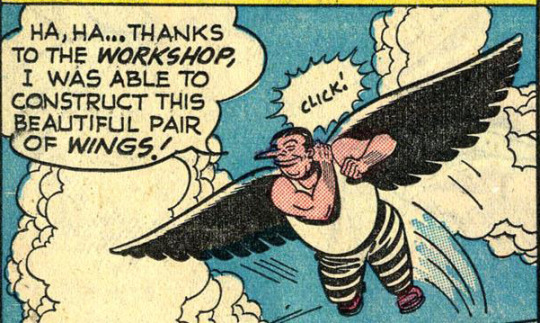
And that is not happening. There is not a single version of The Penguin who would accept these terms or accept this as a thing he's going to do. Short of the most kid-friendly media and even then, much as I argue that he should have rules of conduct, I don't think there is a single version of the Penguin who'd balk at murder or who hasn't committed it with little to no remorse. Oswald Cobblepot may carry much bitterness and heartbreak, but The Penguin loves what he is too much to accept being anything else. He isn't scared of any of these terms and would find them deeply absurd, because who is this, trying to tell The Penguin he isn't allowed to rob this thing, or kill that guy getting on his nerves, or ruin that rich asshole over there. The audacity of this laughing clown! As if he didn't have one too many to deal with!
The other way he lives, at least for a while, is if he turns out to be right about the way Gotham City works, and it turns out that he really cannot be removed from his position without far worse things growing as a result. I don't think The Shadow would have issues with the Batman villains individually, but neither do Batman or most superheroes. It's Gotham City that's the real problem here, and it's a problem that Batman hasn't solved in nearly a hundred years, and neither has Superman or any of the billion superheroes in that universe, a problem that will never be solved so long as there's a profit to be made on Batman. The Shadow can and has cleaned cities of organized crime before, usually by manipulating it's players into destroying each other, but even he has limits and Gotham City is no mere gangster-ridden town, much like how the man who claimed it is no mere crimelord either.
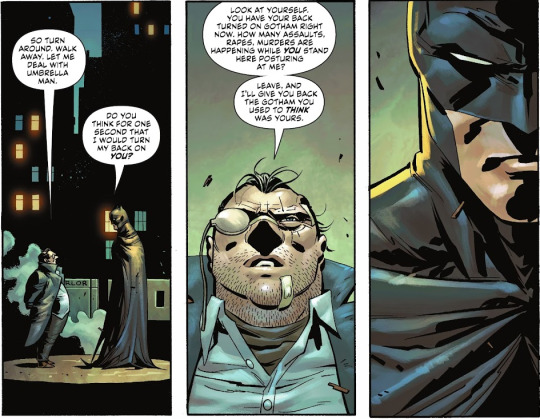
So the final matter at play here is whether The Penguin is right, and if so, whether The Shadow can afford to kill The Penguin, when there are other more pressing matters. Because the biggest reason Penguin's able to position himself where he is, as a necessary evil in-universe and a reocurring side character/even protagonist out of it, is by never being the nastiest or most urgently threatening villain in the room, and therefore always being the one that the heroes have to compromise with or have to defeat quickly to get moving. He has weaponized a Kingpin-esque idea that he is a necessary deterrent, because Gotham can always get worse, and everyone else who can take power in Gotham from him is much worse than him, and therefore you save the most innocent lives by allowing him to do his thing under a leash. Refer that line above, about how The Shadow will not suffer the innocent for the guilty.
There has been at least one Shadow story where he's dealt with this dillemma, in Face of Doom, as I elaborate here. The Shadow defeated the Face through taking the long way around, disarming his individual lieutenants, luring them into traps and disguising himself as The Face and all kinds of strategies necessary to checkmate the guy, but in the process also giving The Face enough time to regroup and strategize and target his agent(s). A similar thing happened when he had to take down Benedict Stark, and had to considerably slow down the operations to rescue Rutledge Mann from kidnapping. Issuing any kind of harm or death to The Shadow's agents guarantees him unleashing carnage on you personally, refer to Gangdom's Doom where he obliterates organized crime in Chicago in response to the death of Claude Fellows, but The Penguin can play smart. He can refrain from doing that, and buy himself more time, as The Shadow goes after those that think they have what it takes.
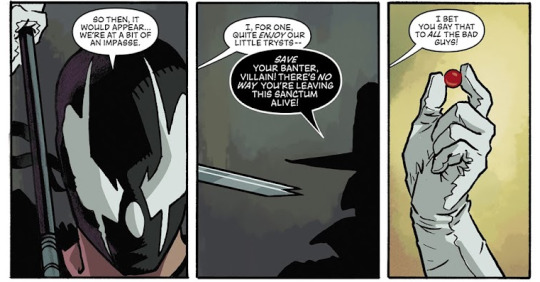
I think The Shadow vs The Penguin would probably pull elements from all of these stories I'd mentioned. If The Penguin is right, The Shadow would have to defeat, or at minimum stall, crime in Gotham City in a way that could then remove The Penguin from the picture, which means The Shadow would have to go through the rest of Batman's Rogues Gallery. Difference being, he's not going to fight those guys forever, he might not even fight them at all.
For The Shadow, he's up against a particularly smart, resourceful and powerful "gentleman of crime". One with personal tragedies and codes of conduct, one who might have even been like the ones he'd been able to reform if life hadn't twisted him, but who at present poses an active danger to the lives of people of the city, and stopping that is the bigger concern. He's taking down not just one crime king, but an empire that the crime king holds at bay, and god knows how many crime kings in the way, and possibly others who would see the innocent suffer for the guilty and keep this stalemate forever. The Shadow doesn't do stalemates, and Oswald Cobblepot is going to repent for all he's done or die, and nothing in between.

For The Penguin? He might very well be in heaven. He's dealing with death itself arriving from nowhere to give him the greatest challenge of all: surviving. Which just so happens to be the thing he does best and takes the most pride in doing. It might even be the kind of thing that makes him feel alive again. Facing down someone every bit the implacable wall of terror the Bat is, but who is less about the martial arts brute showdowns and more about god knows how many other subtler espionage chessplay and psychological mind tricks, and zero hesitation in putting a bullet in his head.
And possibly taking it's sweet time wiping out all of the competition, going through the long list of wiping out all of Oswald's hated rivals and competitors for him, and possibly a few unfortunate friends. Years, decades of playing the long game, gathering his assets, putting pieces in place, keeping his head low, letting the Bats and the others walk over him and forget he's there, and he's rewarded with the game of a lifetime! To be the arch-criminal who took on The Shadow and won! You'd almost think he'd have planned for The Shadow to come after him, and getting very angry if Batman shows up to get on the case to stop this because huur I'm a big selfish brute who wants to hog all the fun, duuuh Oswald you can do better, we don't kill around these parts Shadow huurgh, god, Batman, *waugh* can you BE any more of a self-important killjoy?
Sure, if no divine intervention comes, he's absolutely going to die, he is not walking out of this confrontation alive even if The Shadow has to go through Gotham ten times to get to him. But, you know, the real problem with Icarus was that idiot drowned when he fell, because he forgot to pack a bathing suit.
And you know what penguins do best, right?
*WAUGH WAUGH WAUGH*

#replies tag#the shadow#superheroes#dc comics#batman#the penguin#oswald cobblepot#shadow magazine#pulp heroes
39 notes
·
View notes
Text
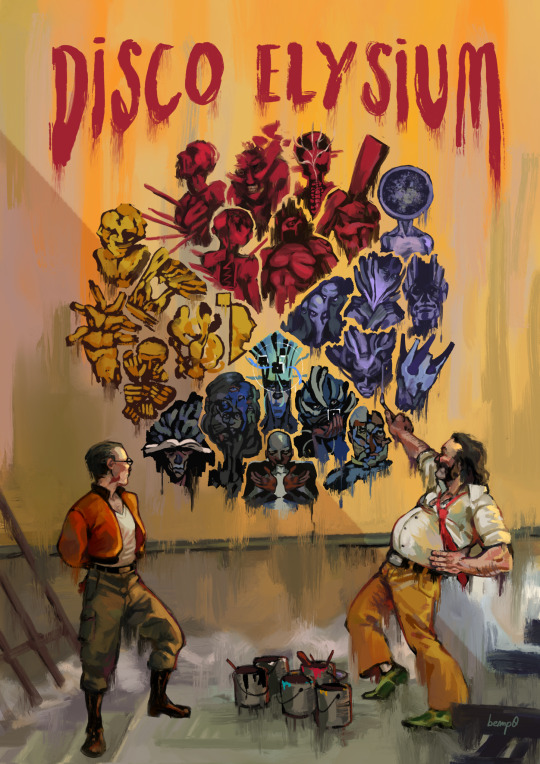
Disco wall
4K notes
·
View notes
Text
Stay in cover and stay away from the parahumans' combat zone.
234 notes
·
View notes
Note
Fuck it, can you expand on your thoughts regarding What Can We Know About Thunderman?
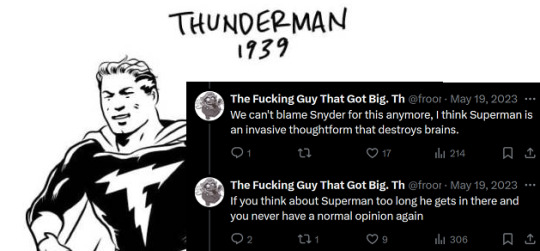
One of the funniest and most horrible things I've ever read partially because like 60% of it is just pages and pages of Alan Moore stating industry facts and names with the serial numbers filed off, and if you have enough comic book brainworms to be reading Thunderman in the first place there will probably be at least one or a dozen references here and there that will spring out of nowhere and hit you like a punch in the gut (the one I remember was the Jack Cole one). A lot of the stuff in Thunderman that reads as absurd funny parody or metaphors too stupid to be real are actual industry facts that Moore has knowledge of, and even the stuff that isn't you can trace a direct line of what exactly it's referring to or who exactly this is referencing.
This is a story in part about how horrible it is to be a sicko with comic book brain worms that is mainly understandable if you're exactly that kind of person. Besides all the references to real-life people and events, most of the modern stuff he's making up are still just as incisive and accurate because literally nothing changed, not even in regards to the movie paradigm ("At last he has attained a semblance to a religious figure. Can we stop now?"). Much of this is Moore dunking on Certain Industry Guys he probably knew and interacted with and indirectly bullseyeing on more recent guys, because a lot of these guys are the same. There are your extremes like the one con-goer here who is pretty much just Max Landis verbatim, but there's also so much that's brutally on-point for industry practices and writers ("What if we had Thunderman do something, and then something happened?") that you can fill in your own names.
It's also an incredibly personal and tragic piece because the core story of it, in between vivid descriptions of Greg Land's office space porn oceans and self-destructive daydreams and rolling catastrophes, is about a guy who deeply loves his art form, deeply loves the creators and artists who gave him so much for so little in his life, and deals with so much horrible toxic bullshit that the only way he finds to live, the only way he finds to not be complicit in the pigsty, is to leave it all behind and work the poison out of his system forever. Like he very openly talks about the protagonist leaving it all behind to go write the next big novel and writing that note, and the non-superhero ideas that will come after, as something that nobody is going to care about, but that he has to do. I don't think I could fully appreciate the sequence where he quits his job at comics and walks out of the office feeling better than ever, until I myself got fired from an incredibly stressful job that made a thing I love (video editing) into the bane of my existence, and no amount of money worries in the world could make me not feel at that moment like I was walking home to the sunniest day of the year.
It wasn't only how much better life was without comics that had startled him, but also how the comics business looked, viewed from outside. How small it was; how cruel and how ridiculous. All the warped personalities the industry either attracted, or else bent and fashioned for itself out of naïve enthusiasts who'd been expecting something else. He couldn't understand why he'd not bailed out of the business years ago, though in a way he could. Part of the answer was just plain human inertia, and part was the fact that, from the inside, comics people and their weird behaviour could seem almost normal.
Dan was grateful he'd escaped in time, though he'd admit that even that escape was qualified. Removing himself from the comics field was one thing, stopping thinking about comics was another. Constantly, he'd find his mind alighting on some decomposing gobbet from the mental garbage-tip of trivia that his career had left him with, when that was the last thing he wanted to be thinking of. He probably should have anticipated some sort of reaction - thirty-something years in any field would leave you with a lot of baggage, and especially an enterprise almost designed to be obsessional, like comics -
His fantasy that he could be a proper literary author, living miles from anywhere and shunning interviews like Salinger or Pynchon, had congealed over this last few months from idle dream to psychological necessity. He'd put his farewell dossier together, and it was published without eliciting much in the way of a reaction or response, but the important thing for Dan was that he'd written it. His lip was better and he could speak normally again, since, for some reason, having quit the comics world, he was no longer trying to eat himself alive. Dan was committed, now, to his new life, and there could be no vacillating. Change or die, those were his options.
And putting aside the fact that "Dan" is killed by the Vince Coletta stand-in and the story itself ends in a much bleaker and more horrible note, to me that feels like Moore being very honest, as depressing as it may be, that nothing else he ever does is gonna get the kind of buzz and following and money and praise that he did for his corporate superhero droppings, and he still doesn't regret one bit what he left behind, and he's going to make the weird magic lizard stories he actually wants to do until he dies and try to not think about superheroes ever again even though he will obviously never fully succeed. Not just because it won't leave him alone, but because it's a part of his life. He loves stories, he loves art, he loves comics, and if not now, he very clearly deeply loved superheroes once, and maybe he still does if he can put aside the sheer nightmare bullshit toxicity attached to them that he's dealt with. I'd even point to a recent occasion he did try just that, with the character of Captain Universe, who accomplishes maybe the only real heroic act in LOEG: Tempest when he stops an atomic bomb from leveling England and ends the story with his big heartfelt wedding.
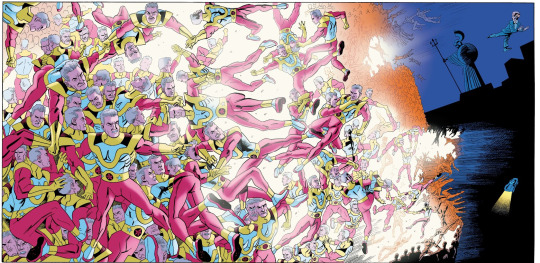
LOEG is the dead last place you'd expect Moore to place a heartfelt send-off to his superhero work, and much of it gets obscured by that asylum sequence where he savages existing IP capes and the farcical elements of the team and other criticisms at the genre, but it's there, and it's maybe the only story that has a happy ending in the book even. With Captain Universe, a character who has no real history, Moore is able to put all feelings for superhero IP and the big two aside and do this platonic ideal of a superhero and the creative possibilities and hopeful fantasy of a superhero. He's willing to poke holes in the guy and ruthlessly make fun of his shitty allies and villains, but LOEG affords Captain Universe an almost shocking degree of dignity (plus the existence of the canceled Superverse, which was going to be a LOEG-esque project with superheroes done with Rick Veitch tying in to The Show, showing Moore had plans to try writing superheroes again on his own terms even after everything). I think Thunderman in large part is about conciliating these feelings with a large degree of autobiography.
That's one emotional core of the story, but mainly I remember Thunderman for being really fucking funny. The EC Comics hearing. The porn ocean odyssey. Stan Lee Stan Lee-ing so hard he nearly gets killed by gangsters over it and one chapter detailing his transition from person to Character. Marvel was all along a CIA conspiracy to promote radiation poisoning. The chapter that's entirely dedicated to Moore stopping the story to riff and review the Superman movies. This books swings widly and it's an incredibly entertaining read.
And maybe the most horrible thing about Thunderman isn't in the way it's protagonist meets it's end or in the final chapter or even *gestures broadly at all of it*, it might just be the chapter before Alan Moore drops his Superman movie reviews, because with it comes the realization that yes, Alan Moore has been to Reddit, and has looked enough into reddit superhero discourse to be able to plausibly imitate it, which means he probably has sat through at least one argument about him too many. The stand-out of that chapter is the bit where he's riffing on Cavill's mustache fiasco and the DCEU, but it also includes some bits that now read as pretty perfect bullseye jabs at the MCU's current state of affairs.



#replies tag#superheroes#alan moore#illuminations#what can we know about thunderman#comic books#superhero comics
42 notes
·
View notes
Note
I guess it's also time for the annual ask: Thoughts on The League of Extraordinary Gentlemen?
@mirrorfalls asked: Perhaps it's time to touch the elephant in the room: thoughts on League of Extraordinary Gentlemen?
anonymous asked: Any thoughts on Moore's LOEG?
anonymous asked: any advice on how to do a fictional character mashup story ala chimera brigade, league, etc?
anonymous asked: you wrote a bit on the wold newton universe and the chimera brigade, any thoughts on league of extraordinary gentleman?
(TW: sexual assault, also a whole lot of racism)
(clip from Anti-Spook Squad by Doctor Lalve)
Let it never be said I don't love or do anything for you people because Jesus Christ what an ordeal.
It was pretty inevitable that I'd eventually have to talk about LOEG given the, niche, I made for myself here, and given I'd read and touched on all these other works that either inspired it or were inspired by it, like the Wold Newton Universe, The Chimera Brigade, Tales of the Shadowmen and etc. I'd read through plenty of different LOEG takes and fics, it's an idea that has a lot of appeal on it's own and is easy to flirt with, if not so easy to pull off.
One thing to put upfront: Kevin O'Neil was a brilliant, one-of-a-kind creator and his work here is great, it's the one thing almost unimpeachably great about the whole thing except when he's asked to draw racist caricatures, which he does quite a bit, we'll get into those. I love the collaboration between Moore and O'Neil and I frequently enjoy the little tidbits where they show up as themselves within the supplemental material. O'Neil does a lot of heavy lifting in these even at their worst, in fact especially at their worst. This comic is a legitimately impressive achievement, and I don't regret reading it, if nothing else I think it was a hell of a wake-up call in regards to all of it's warts I may have been overlooking or replicating in my work or that of others.

I'm gonna break it down by going through the individual installments:
Volume 1: One of the nicest things there is to League is that it only keeps getting better, in the sense that it starts off on the worst foot and it gets better by virtue of not really being able to get worse (yes, even with the Golleywog and Harry Potter sections and whatever). From the moment you open the book it takes about six pages for Mina to be assaulted by Brute Arab Rapist Hordes that Quatermain and Nemo have to gun down, and that pretty much sets the stage on what to expect. Volume 1 is where the series has yet to jump off the deep end in tackling all of fiction, being a more grounded adventure story based on it's premise of being a comic book crossover/hero team comprised of Victorian era literary characters. It's LOEG at it's shallowest and most straightforward, and also at it's least impressive. I'm not remotely charmed by much of what's done here, I've seen a million variants of these before and many of those weren't that great either, but their lows weren't as catastrophic.
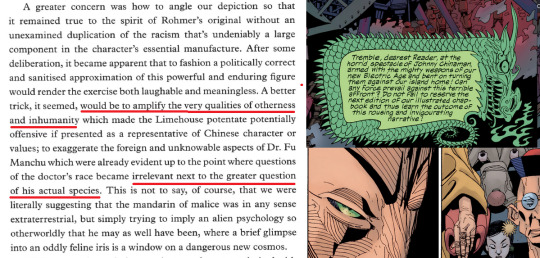
(text comes from an essay Alan Moore wrote regarding his usage of Fu Manchu in the book, which was scanned and sent to me by @mirrorfalls, thank you for that.)
The LOEG's first enemy is Fu Manchu and the book sure likes depicting leering hordes of yellow peril cartoons for our heroes, Mr Hyde in particular, to brutally mow down. Alan Moore thought the genius trick to making Fu Manchu not-racist was to make him as inscrutable and sinister as possible so as to not even appear human, which is a great understanding of how racial caricatures work guys, the "not potentially offensive" shirt has people asking a lot of questions answered by it.
I've heard a lot of claims over the years that LOEG was intended to be a parody, or satire, and that it's using Fu Manchu to make a point as a criticism of the British Empire and imperialism, and I'm gonna make this clear before we move on: LOEG is not a parody or satire, not as a whole. It parodies and satirizes a lot of things, but it is neither parody nor satire. It is very much in love with much of it's subject matter even when it wants to burn it down. LOEG is also a frankly terrible critique of imperialism, it is one of the most imperialist things I've ever read. Part of it is because you can't just recycle problematic garbage and claim it's commentary, especially when you're going out of your way to sensationalize said garbage to be provocative or in many cases add shit that wasn't even there in the first place. Moore asked if anyone else was gonna try and criticize colonialist bigotry in fiction by tripling down on reproducing it as hard as possible, and then didn't wait for an answer before doing it.
Volume 2: Objectively an improvement over the first if only because Fu Manchu isn't there. It's also where the book kinda improves in terms of making a critique. LOEG never really has much to say about it's characters, instead developing them in service of the story or social commentary, and Volume 2 is better at it than the first. Still has a lot of the same problems as 1, it's still a shallow team-up thing that wants to have it's cake and eat it too, it's still the worse version of a concept that's been done many many times before and after. Edward Hyde gets the bulk of the focus here and he was very clearly Moore and O'Neil's favorite character to work on, he gets the most memorable sequences for better or worse. I don't wanna talk about him much and I don't wanna talk about how the book wraps up the Invisible Man's subplot (and how it's not even gonna be the last time sexual violation of a villain is played for oh-so-horrific catharsis), I'd frankly like to stop thinking about it.
The Traveler's Almanac was definitely the most exhausting part to read in full and only not a total waste of time because of Jess Nevins' annotations, which turn this into fairly valuable research material. But so do Wold Newton articles and they're really not the most riveting thing to read, and at least those have a point or constrain themselves to a single topic or character, or are briefer and come with resources on hand or have a point or even can pitch some neat/cool ideas and concepts as a whole. Jess Nevins even did the better version of this in his own WNU chronologies.
Where as this is just complete ass and there's only so many times you can read a variant of "and then we went to this place with horrible cannibal savages and then we went to the other place with beautiful cannibal savages and then we found this utopia and then we found this dystopia and then we referenced this and that and this and that", and it brings me to another point I'd also seen brought up a lot in regards to LOEG: that it's too damn anglocentric to live up to it's premise, too contradictory within itself, and it was always too big of an undertaking to be done the way Moore and O'Neill did it.
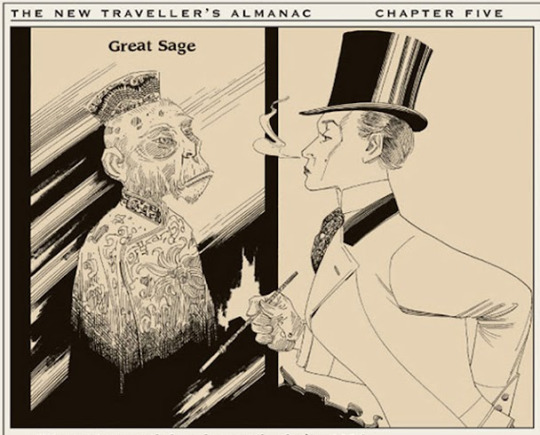
I appreciate Moore trying to make this world feel like a world, in as gigantic all-encompassing a scale as he could possibly account for, with a full world tour and internal chronology. I sure would have liked a big fiction crossover almanac with entire chapters for Africa and China and South America, but we don't get that, because EVERYTHING in them is taken from colonial texts elevated to fact. Literally, entire paragraphs taken from political and colonial texts. All the time spent dicking around with all of those Euro political texts and ancient lore that just had to be paid it's due, and then Orlando goes to China and finds Sun Wukong stuffed as a public freakshow and dismisses his mythos as a bunch of loony (but intriguing and exotic!) hogwash, and Godzilla is later brought up in one line of dialogue to mention how Hugo Hercules killed him offscreen. (I think those might be the only two texts Moore brings up that aren't from European/American sources? There might be others but good luck finding them in the annotations).
Is it unfair to expect Moore to have read all of fiction? Of course it is, but that's what he wants this to be about, he wants this to be about All of Fiction and he wants to write about Africa and China and South America with nothing but colonial texts about those places as reference. He wants to write about how the things he likes are cool and happened and are real while the things he doesn't like don't count or are garbage or didn't happen the way we were told happened. He wants to make a story criticizing racism and misogyny in fiction while writing a text far more racist and misogynistic than most of the things he's bringing up. It's irreconcilable.
Black Dossier: It's constantly jumping between different formats and having to adjust it's prose and visual style accordingly, and it does that fairly well (the beatnik section is completely fucking unreadable though, the prose sections are already a handful to get through as is but that one was too much even for me), although Tempest I think is gonna do it much better. It's got some good parts, it's also got some bad ones. Definitely more readable than the prior two + Almanac.
This is the one with the Gollywog in it and I'm not gonna talk about that thing, I think what's wrong with it is self-explanatory as is. Look, I truly love a lot of Moore's work I've read, and I think a lot of the pushback against Alan Moore painting him as just a cranky old man who hates comics is overblown and shitty and symptomatic of bigger issues with how fans discuss comics and superheroes, but his defense of the Gollywog and his response to the criticisms of LOEG was embarassing and beneath him.
Century: This is the one with Harry Potter and The Lightning Penis in it. To those of you who heard at some point that Alan Moore had done a much-maligned pisstake on Harry Potter and got curious, don't get your hopes up. It's nothing, it's not even that mean, it's just a crude crayon doodle in service of a larger and very dumb critique of modern fiction that could have been anyone. Shame that he bullseyed ahead of the schedule the cultural about-face against Harry Potter without having anything actually criticizing Harry Potter to show for it.
Century does work for me a bit better because it dispenses with the pretense of the series and has it build up to the big awful tragedy it ends on, with all of it's remaining characters miserable immortals and all the fictions having curdled up and gone sour. It works for me only because I have no love whatsoever for this world and so it destroying our characters in the service of the larger narrative about stories and fictional immortality and whatnot is a decision I agree with and I think makes it stronger, even if the social commentary / the story's criticism of modern stories compared to the old ones is frankly absurd. Century I think was perceived as Moore/O'Neill having lost the plot, but to me it feels like the plot (more importantly, the point of it) finally showing up after so much pointless dicking around.
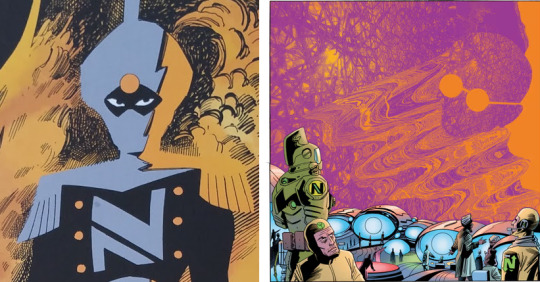
The Nemo trilogy: Easily the one I most enjoyed reading, the Nemo Trilogy is almost like a breather set in between books, just fairly straightforward pulp adventure stories done in far less rancid a fashion than Volume 1. It feels less like a LOEG book and more like one of those LOEG fanfics made by people who like the concept and characters but are dissappointed by the books, so they fill or add or rewrite in the blanks with their own ideas, which is basically every LOEG fanfic ever made. I quite like Janni Dakkar as a character and I'm already a huge mark for Captain Nemo, one of my favorite characters ever, and I was of course very glad to get away from the extremely tiresome Mina/Allan/Orlando trio for a change. Frankly I'd even recommend these as a standalone, they're so disconnected from everything else in LOEG.
If you guys want to read a comic take on Captain Nemo though, read Mobilis by Juni Ba. Infinitely better than anything Moore did with the concept of Nemo, takes far less pages to actually explore the character meaningfully and has far more interesting, more humane and personal things to say and do in general, one of the best things I ever read and a tremendous palette cleanser after LOEG.
Tempest: Tempest is what I'd call the best of the LOEG books, in terms of craft and in terms of achieving what it sets out to do. Namely, it's one of the most elaborate and most artistically impressive slowly unfurling middle fingers I'd ever read, Alan and Kevin in full burning down the house mode throwing everything they've got at the wall, playing around with as many different styles and gags and ideas as they can cram into the great apocalyptic ending of their collaboration. It's a very spiteful work that has a lot of joy and humor to it, fully divested from giving a shit about it's characters and instead recasting them as the bit players they always were in the grand fuckening of humanity at the hands of our fictions.

It gets to burn down everything and also preserve everything in a big dreamy Noah's Ark forever, it plays to every strength the series had, and frankly I barely minded the detours because this thing is all detours. The superhero parody that takes up so much of it isn't really anything funny or insightful or really anything, but there's good bits in it, and I like Alan Moore talking trash about superheroes (of course, it pales in comparison to What Can We Know About Thunderman, but that one is a league of it's own). It's Alan and Kevin's farewell to comics with all the mixed feelings towards it and the industry and the subject matter they both have decades of so much experience with it. It is The End of Everything and I think it ended on the best note it could have ended with.
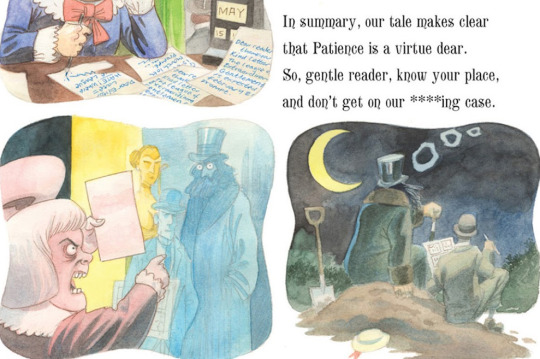
In summary, I think LOEG has a lot of individually cool or neat or even great ideas that I think get lost, because there is so, so much of it, and so much of it is impressively painted sludge. Sometimes it is ingenious, sometimes it is fun, it is never not visually impressive, but it's more frequently dull and grotesquely self-indulgent and far too shallow. It suffers from an almost inescapable side effect of doing this dealing with the fiction he was dealing with without accounting for taste or bothering to reign in his worst impulses, too much to cover and not enough actually being said about it. In truth, much of it doesn't feel much different than reading the wiki summaries for it I had already read forever ago. It is a unique beast taking swings that I'd never seen before that most wouldn't, probably for very good reasons most of the time. It is also guilty of literally everything it's criticizing other works of being and doing, and sometimes it actually provides it's best commentary because of that! It's a complicated thing to tackle and wrap your head around. God knows what Jess Nevins must have gone through to make the annotations for this, as they put it on the Almanac annotations.

I don't consider it wasted time because, I did really enjoy the final two installments, there are good bits scattered across the other books and I learned some good things from it as a whole, but would I recommend it in it's entirety? Unless you're really a huge fan or completionist for it's creators (although reading LOEG really disillusioned me on Moore in a lot of ways, not that this is a bad thing, if anything that's a necessary thing to really try and grasp a creator's body of work) or you're the kind of sicko who'd be in the tank for the whole thing, no, not really.
It is one of the most impressive and accomplished works I've ever read, I will probably come back to it for research purposes, but holy shit am I glad to put it behind me.

#also thank you davidmann for sending me the epilogue#replies tag#loeg#league of extraordinary gentlemen#alan moore#kevin o'neill#abc comics#comics
48 notes
·
View notes
Text
Alright, funniest/best setting for post-GM Taylor to get isekaied to. Everyone shoot
267 notes
·
View notes
Text


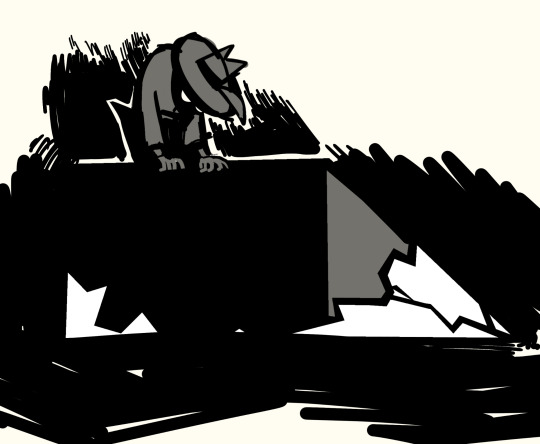
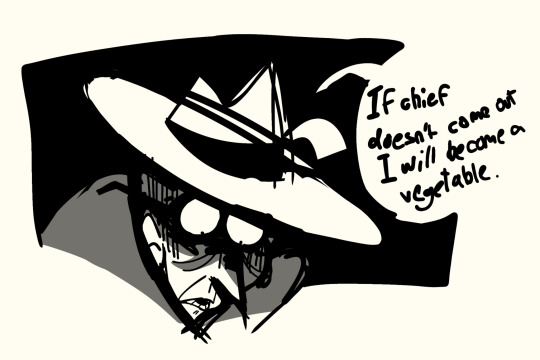
his agents have built in self-destruct protocols nice
27 notes
·
View notes
Text




his agents have built in self-destruct protocols nice
#average Shadow agent has a self-destruct protocol factoid actually statistical error#clyde burke#whose first scene was him jumping into traffic so he could take a shortcut to work#is a statistical outlier and should not have been counted#shadow magazine#pulp fiction#the shadow
27 notes
·
View notes
